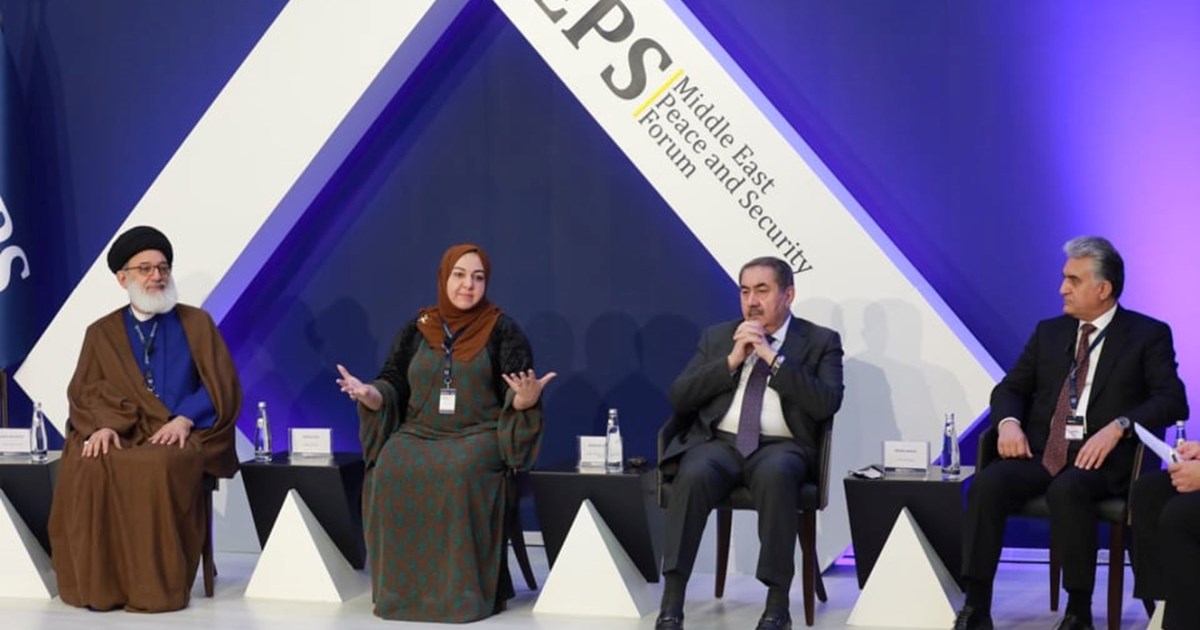Speaker Faiq at MEPS Forum emphasizes federalism, economic diversification and regaining people's trust

Kurdistan Parliament Speaker Dr. Rewaz Faiq on 16 November 2021 spoke at the Middle East Peace and Security Forum (MEPS), a major conference at the American University of Kurdistan-Duhok,. In a panel on the future of Iraq after the recent elections, Dr. Faiq said, “Iraq needs stability in terms of protecting the sovereignty of its borders, diversifying sources of income, acceptance that Iraq’s system has become federal.”
Deputy Speaker Hemin Hawrami, Secretary Muna Kahveci and several MPs also participated in the MEPS Forum. Other speakers included President Nechirvan Barzani, Prime Minister Masrour Barzani, KRG and Iraqi ministers, Iraqi politicians and national and international analysts and experts.
Speaker Faiq in her remarks said, "Generally during elections all the political parties decide how to campaign and publicize their views, they follow a specific path. And in the elections any political party or movement can show what sets them apart, they are free to do so. But after the election, the situation changes to the necessity of working together.”
She added, "This doesn’t mean that the political parties have completely put aside their differences, which will remain, but a more important issue of the greater interest comes to the fore, and tensions that arose during the election reduce. The political elite is wise enough to know that the tensions during the election mustn’t be transferred to the post-election period, the political process needs calm and wisdom.”
The Parliament Speaker also spoke about three-way stability in Iraq, with the possibility of Iraq becoming a source of stability in the wider region. She said, "The political leadership of Kurdistan in 2003 voluntarily participated in building a new Iraq, based on republicanism and the Kurdistani people’s vote in favour of the Iraqi Constitution, meaning that our people were willing to accept a deal with the new Iraq. This initiative was established in the discussions on the Iraqi Constitution, and we all insist that the Constitution should be implemented as it is. But the fact is that we have to change something else about ourselves: The political and governing elite in Iraq must accept that this country has changed from a centralized system to a federal state, and this change should be reflected at every juncture.”
Dr. Faiq gave two examples of laws that were passed in the previous term of the Iraqi Council of Representatives: the Provincial Election Law, which was a violation of the Constitution and which the Kurdistan Parliament successfully challenged legally; and the Iraq Financial Management Law, which Kurdistan Parliament could not challenge because the federal court accepted it.
She said that she wants Iraq to be strong politically and economically, and in a political position to protect its borders.
"We are in another race for stability, it is important that both the winning and losing parties accept the results of the election, because the state is built on the election results," Speaker Faiq added.
The Parliament Speaker added, “We should all know that the lack of participation in the election isn’t normal and will not just pass. An Iraqi refusing to vote, whether in Kurdistan Region or Basra, is not the same as someone voting in a democratic country, where their life is secure, there is great stability, in terms of education, health and politics as well, and they believe that change through elections don’t have much of a role and impact on their life.”
“The election boycotting [low voter turnout] in Kurdistan Region and Iraq should be debated and researched, and forming a majority or consensus government is not enough. The main goal of this government should be reconciliation and building trust, because the political process is better when everyone participates.”
"The third pillar of stability is the economic issue. The next government, the new cabinet and the House of Representatives should have as their main goal to change Iraq from an oil economy to one that has many sources of income."
She also emphasized that Iraq's economy should develop other sectors, as it is hostage to the oil market and should not continue as it has done for the past 16 years.









